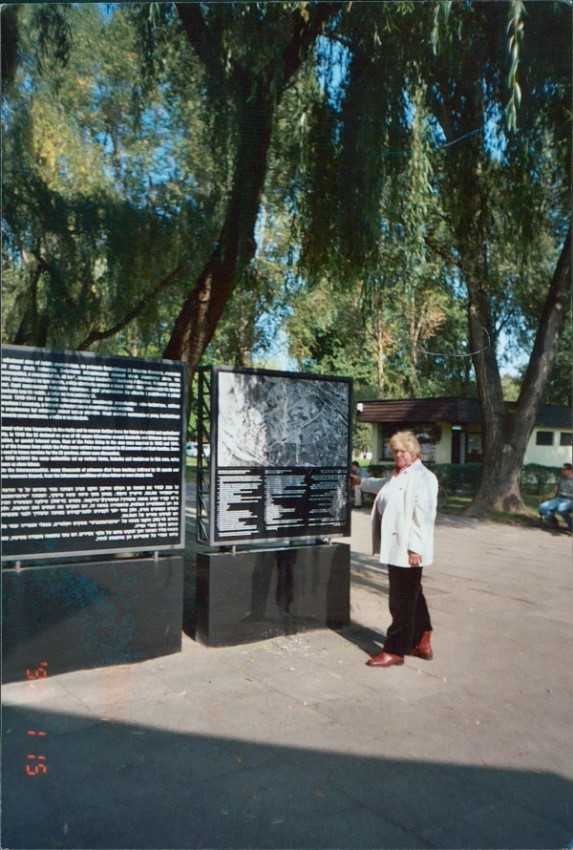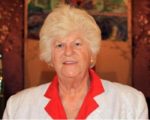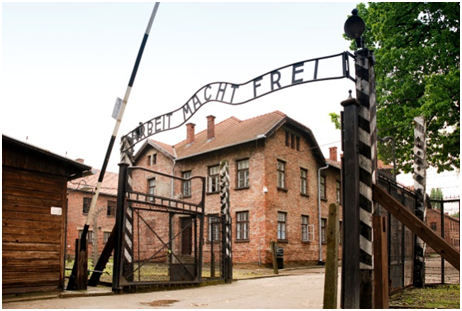
By Jacklyn Lewicki

SAN DIEGO — Where is Auschwitz? What is it? Who did it concern? Who cares now? We are now living in the 21st century and that happened so long ago. Older generations will say, “Enough let it alone; it is long gone.” Younger generations will raise their eyebrows puzzled, “What are you talking about?”
“Auschwitz” is a word, which has been said millions and millions of times since 1940, or even before since someone thought of it among the Nazi commando.
I myself have said it thousands and thousands of times through my life and it has been on my mind as many times that I did not speak.
Auschwitz is not only a word; it is a place; it is an abomination; it is a cancer in the human race.
I have said this word so many times because it is part of me; it is part of my heritage and of my upbringing; it is a part of my life; it is my pain; a part of my make up that I cannot remove.
I have lived with Auschwitz since 1940, when the war broke out for me and my family in France.
I will tell you that even having said and heard this word all my life, I did not know where it was until I was almost 70 years old. It was during my visit to Krakow, Poland, that the people with whom I was staying told me that Auschwitz was 70 kilometers away to the north of the city.
So, I decided to go and pay respect to my father, his two brothers, my aunt Bella and my two young cousins, Max and Sarah, who were murdered there among the 6 million Jews slaughtered, as well as all the others, totaling 20 millions souls, and affecting all the generations since then.
I really thought that Auschwitz was in Germany. I had never asked the question about where is it; it was too painful to think about it. I could never read or listen to stories about the Holocaust.
I was five years old when they took my father away to ship him to the extermination camps. I do not know if he survived the horror of the transportation in one of those cattle cars.
So, knowing much later where it was, I had to go and pay respects to my family and to all those souls who perished there.

I walked the grounds of that death camp. I saw the irony of the statement above the gate; arbeit macht frei (“work makes you free”). I saw a documentary about the death camp, which told about the routine the prisoners had to go through, early in the morning, with barely anything in their belly. The Nazis pushed them out to go to work in the fields, marching 5-by-5 so the SS up on the roof could count them. Inside on a raised platform, Jewish musicians played marching music.
At night when they came back, hey had to carry with them the dead bodies of the day so the guards would have a “perfect” count.
I saw the barracks, but I did not go inside. It was too much for me.
I saw the wall between Barrack 10 and 11 where the SS shot the people they caught trying to escape and the Polish people who tried to help. They lined them up naked and shot them. Then they were dragged to the crematorium to disappear forever.
I did not spend too much time there, but took a few pictures of the
posters. I next went two miles away to the other camp, Birkenau. That is where the trains used to arrive, with the survivors and those who died during the journey.
Some barracks and (oven pipes) are still there, as is the train track over which victims from all over Europe traveled.
Birkenau is where the “triage,” the selection took place.
To the right or to the left. One line went straight to the gas chambers and the other to a work camp, for those strong enough to labor until they died.
All the Auschwitz survivors have been living with those memories. They have “gifts,” such as the number tattooed on their forearms, the physical and mental pains that never goes away, and the ripping feelings inside when they think of their lost ones.
There are few, if any, Jewish families who have not been emotionally touched by the atrocities of World War II or by the Holocaust, Auschwitz and the other death camps.
As I said before. that word “Auschwitz,” has been spoken, mumbled, remembered, and written millions of times and always with pain, and it will go on.
For the German it is a black mark in their history and for their country.
What is Auschwitz? It is pain. It is the mark of the devil.
It is the ghost that is alive and still wakes up sleeping people in their beds, those people who have been tortured and brutalized by a people who felt they were the Aryan Race – the better and unique people who had all the rights.
It is the memories that pop up any time, any place for the survivors.
I was one of the lucky ones. Along with my brother, sister, and mother we escaped being sent to those death camps — we were not taken to those infernos — but it does not lessen our pain.
I suffer the pain of all those people who perished there, because we are all one.
I identify with the pains of all those people – whenever I think or hear “Auschwitz,” I am right back there with them.
We are all One – and when someone is beaten or burned we all feel it.
I feel it all the time, I live it all the time,
It is more than memories – it is more than impressions – it is happening
right now to me.
*
Jacklyn Lewicki is a Holocaust survivor, member of Congregation Beth Israel, and a resident of San Diego.
Excellent article.
We are all one…
I hear you…
I can feel you…
Your words invite me
to go inside …
To connect with IAM
Where we are all connected.
THANK YOU…
For your words…
For that reminder…
Jacklyn, this is a fantastic article! I never realized how closely you are connected to the Holocaust. I have been doing extensive reading about it even currently. Thank you so much for sharing this with me.
Thank you Jacklyn, That sounds so very personal and of course it is. Thank you for expanding our vision of what this all means to you. My son always mentions what it means to have visited as a student, in todays political situation. Beyond belief unless it happened as it did to you. May we all strive for peace.
We received this postscript from the author:
Hello Don, thank you so much for your kindness in publishing my article- REMEMBERING AUSCHWITZ NOW 2020. I have been working for years to put it together and finally finished it with all the pictures I wanted to affix to it.
I would be proud of myself, except that my little story and what I went through in World War II. About being in hiding for almost 5 years by different French ladies and away from my mother, is nothing compare to the story, that I just watch about Tova Friedman- A Conversation with Tova Friedman – Holocaust Survivor-I knew a lot of the horror that had happen to the prisoners in the concentration camps and in the ghettos, but listening and seeing Tova Friedman talk for 2 and a half hours about the horror she remembers as a 4-5 years old child- is hard to imagine the reality- of the situation. So about my little story? What can I say it is just my recounting my trip to Auschwitz in 2003-as I said it is nothing compare to what they subjected people and children in this terrible War.